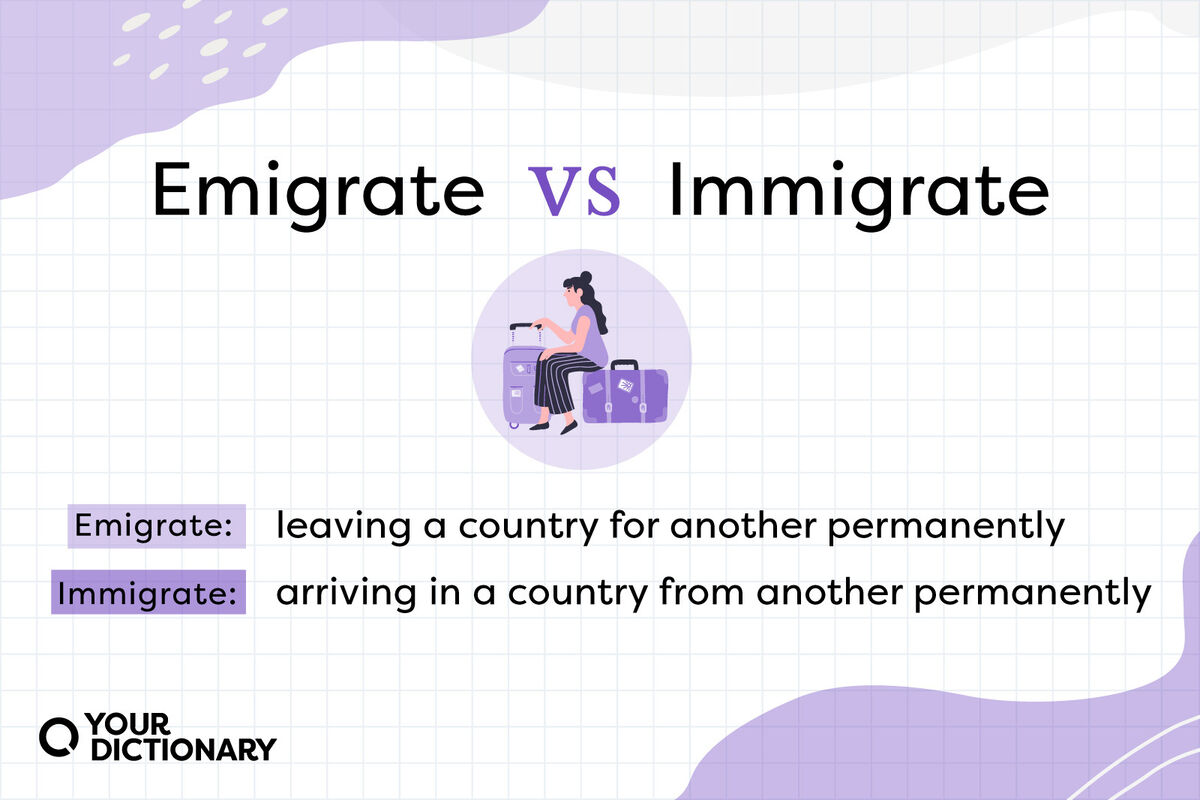
The key difference between emigrate and immigrate is whether you are coming or going. The term "to emigrate" means you're leaving your old country to come to a new country. On the other hand, when you immigrate, you’re coming to a new country from the country you were born in. Check out each term with examples to see the whole picture of the difference between emigrate vs. immigrate.
Emigrate: Away From One Country
The word emigrate means “to leave one country for another.” We use emigrate to describe the act of permanently relocating from a home country to a new country. For example, “Tyler’s family emigrated from Switzerland a few years ago” means that Tyler’s family left their home country of Switzerland to come to a new land to live.
Emigrate comes from the Latin emigrare (“to move away”). Its prefix is a variant of ex- (“away”), essentially becoming the opposite of migrate, which simply means “to move.”
Using ‘Emigrate’ in a Sentence
You can use emigrate in a sentence any time you’re talking about a person or people (emigrants) leaving their home country for another. For example:
- My parents emigrated from India about 10 years ago.
- I heard that her family emigrated from Pakistan.
- We are emigrating from Honduras.
- The emigration of the family was needed for their survival.
- We are going to emigrate from Russia to be closer to our family in Brazil.
- My grandma emigrated from Japan.
Immigrate: Into a New Country
Immigrate means “to arrive in a new country after leaving another.” It’s the step after emigration that focuses on where you are going, not where you left. For example, “Tyler’s family immigrated to the United States a few years ago.” This means that Tyler’s family permanently moved to the United States from another country.
Like emigrate, immigrate uses the root word migrate to demonstrate the act of moving. It adds the prefix im- (variant of in-) to show movement “into” something — in this case, a new country.
Using ‘Immigrate’ in a Sentence
Sentences that discuss immigrants moving to another country include:
- My grandpa immigrated to Brazil in 2000.
- My family immigrated to China.
- He immigrated to the United States.
- The whole family immigrated to Belize.
- To be closer to his family, he immigrated to Canada.
- Our whole family immigrated to Japan for my mother’s job opportunity.
What About Migrate?
The word migrate is the base of both emigrate and immigrate, but its meaning is slightly different than both words. While emigrate and immigrate refer only to people, migrate most often refers to animals that move to different climates when the seasons change. Additionally, migration is a temporary change, while emigration and immigration are permanent moves. For example:
- After migrating south to Mexico, monarch butterflies hibernate until spring.
- My grandparents migrate to Florida once the weather gets cold in the Northeast.
- Arctic terns are known to migrate around 25,000 miles every year.
- Pods of whales migrate thousands of miles when it’s time to breed.
- Migrant workers travel from place to place to find work.
- Dragonflies often migrate in enormous swarms when seeking warmer climates.
Tips for Remembering the Difference
If emigrate vs. immigrate vs. migrate still confuses you, there's a sure-fire way to keep them straight:
- Emigrate starts with “e,” just like exit.
- Immigrate starts with “i,” just like in (as in “coming in”)
- Migrate starts with “m,” just like moving.